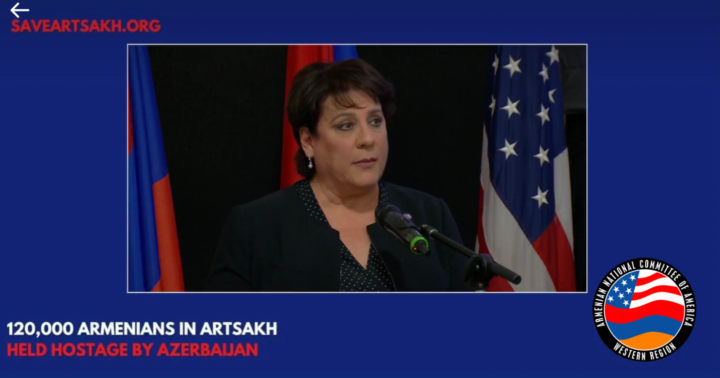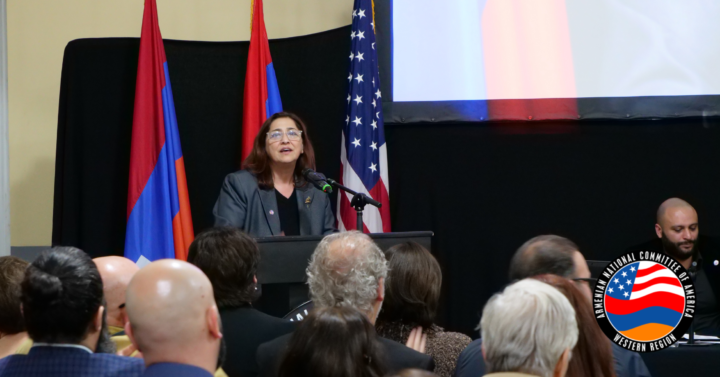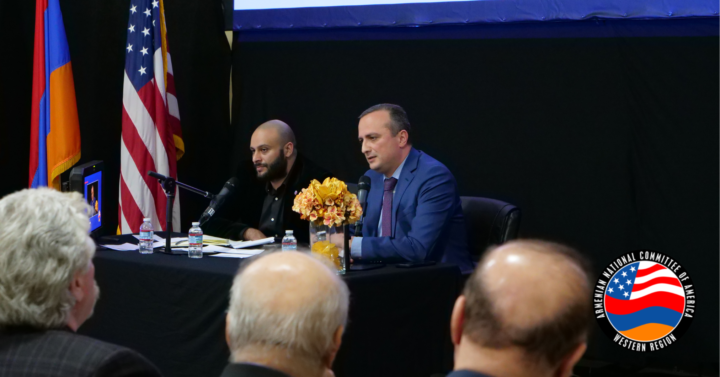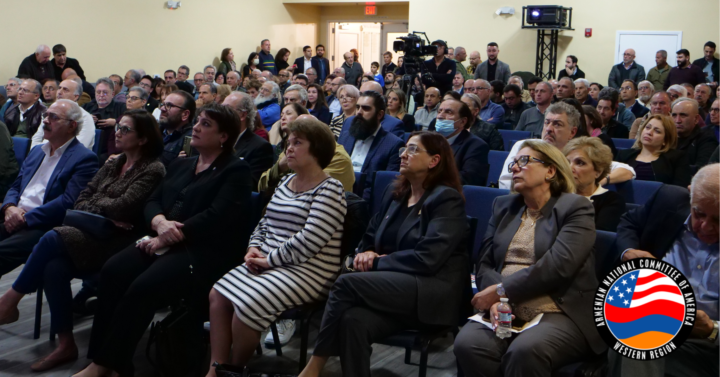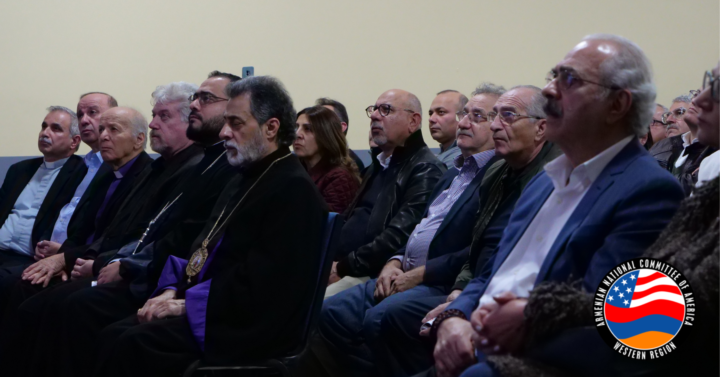Over 200 Community Members Attend Town Hall with Republic of Artsakh State Minister Ruben Vardanyan
February 7, 2023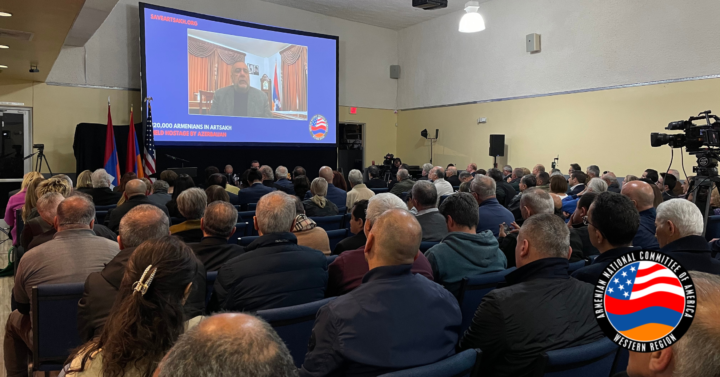
On February 6th, the Armenian National Committee of America Western Region (ANCA-WR) hosted a packed Town Hall meeting with the State Minister of the Republic of Artsakh Ruben Vardanyan, who joined virtually from behind the blockade in Artsakh, to update the community about the current situation and illegal blockade by Azerbaijan which has now lasted over eight weeks.
More than 200 community members, activists, and esteemed guests gathered at the Krikor and Mariam Karamanoukian Glendale Youth Center to hear Minister Vardanyan’s report and ask him questions regarding the nuances of the blockade, actions the diaspora can take, and the future of the people of Artsakh. Hundreds more watched online from all over the world as the event was live streamed on social media.
The event took place on the 57th day of the blockade which has left 120,000 Armenians in Artsakh without adequate food and medicine supplies, gas to heat their homes, electrical power and internet access. “We organized this Town Hall because we felt it was important for our community to hear directly from Artsakh’s official government representatives and have the opportunity to ask questions and express solidarity with the people of Artsakh,” said ANCA-WR Chair Nora Hovsepian, Esq. before introducing Minister Vardanyan. Also participating in-person at the Town Hall was the Permanent Representative of the Republic of Artsakh to the United States Robert Avetisyan.
Representative Adam Schiff joined virtually to reiterate his commitment to the Armenian community both in the United States and abroad, and described his recent and ongoing initiatives in getting U.S. and international attention towards alleviating the blockade. “I am working with the co-chairs of the Armenian Caucus on a resolution that will condemn the blockade of Artsakh that will call on this administration to impose the sanctions that are required under Section 907, that will end the waiver of Section 907, and that will cut off any further U.S. assistance to Azerbaijan whatsoever.”
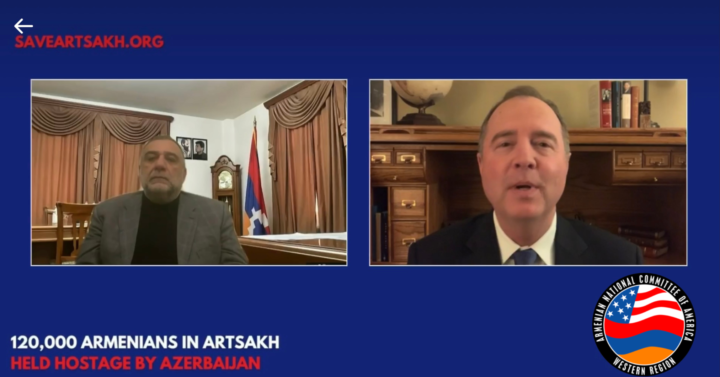
In a bold and significant move, Representative Schiff also announced that he has invited the Permanent Representative of the Republic of Nagorno Karabakh Robert Avetisyan to personally attend the State of the Union Address on February 7th as his official guest. Representative Avetisyan, speaking on the issue abroad said, “We hope that the situation will resolve soon (and) that there will be a negotiated, mutually acceptable outcome, but the more days that pass under blockade, the more it seems that this is not going to be a civilized solution, as the human consequences have begun to take their toll.”
On behalf of the ANCA-WR, Board Chair Nora Hovsepian provided a summary of all the steps being taken by the organization to draw attention to the plight of Artsakh, including hiring a PR firm, building non-Armenian coalitions to express solidarity, meeting with various editorial boards and journalists, securing statements of support for Artsakh and condemnation of Azerbaijan from elected officials at all levels of government, and activating Armenian youth and students to take action. The ANCA-WR reaffirmed its full commitment to allocate all its resources toward advocating for the rights and protection of the people of Artsakh.
Minister Vardanyan began his address by thanking the Diaspora communities for their consistent involvement, interest, and action on Armenian issues after which he began to discuss the consequences of the ongoing blockade. “Azerbaijan is doing everything it can to make life difficult for us. They cut off gas and electricity at their whim. They are doing everything they can, not only so we lose the ability to live our daily lives normally, but so we don’t have a future at all. With Azerbaijan’s ongoing aggression toward us, there is no scenario under which Armenians can ever live in peace under Azeri rule. We are here to stay on our ancestral lands and we must be allowed to exercise our right to self-determination.”
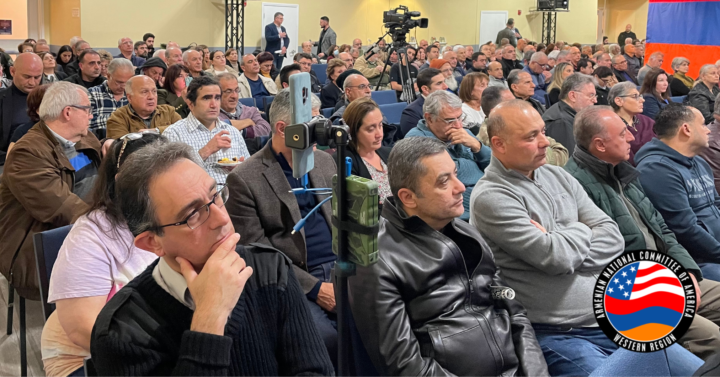
Despite assuring the crowd that the civilians of Artsakh are very strong and committed to their survival, Minister Vardanyan described the bleak circumstances surrounding assistance and the delivery of life-saving resources by saying, “If you count the number of Red Cross and Russian peacekeeper resource vehicles that enter in around one month, it is equivalent to the amount of vehicles that would enter Artsakh in one day before the blockade began.”
Attendees were encouraged to prepare their questions for Minister Vardanyan, many of which were on the topic of steps the Diaspora can take to help make a difference for the suffering men, women, and children in Artsakh. “It is imperative that people do not forget what is happening in Artsakh and to keep following the news. Whatever can be done to draw international attention to our plight by the media, governments and international agencies should be pursued by our compatriots all over the world. We greatly appreciate the solidarity and support of our people worldwide,” said Vardanyan.
The International Committee of the Red Cross (ICRC), is the only organization that has had access to Artsakh through the Lachin corridor. The ICRC has recently set up a fund that goes to delivering medicine, infant food, and the continuity of emergency health and ambulance services, an effort that the Armenian Cultural Foundation is also promoting with the ICRC. Community members may assist the community of Artsakh by making direct donations to the ICRC Lachin Corridor Emergency Fund https://www.icrc.org/en/donate/lachin-corridor-emergency
Since November 9, 2020 and the end of the second Nagorno-Karabakh war, Azerbaijan has violated the terms of the ceasefire agreement numerous times and is now violating a term in the mandate which states that the Lachin corridor must remain open. Russian peacekeepers in the area have not been able to uphold the terms of the mandate, as the blockade exceeds eight weeks and the corridor remains closed. As attendees prompted Minister Vardanyan for his solution, he explained, “On one hand we have Russian peacekeepers, but their numbers are very limited, less than 2000 people… The people who blockade the road, formally represent the civil society, and weapons cannot be used against them by peacekeepers. This creates a situation that is very difficult to solve using military forces”.
In his closing remarks, Minister Vardanyan reassured worried attendees, yet offered a realistic perspective, “We are okay, (but) this is the problem: without medicine, without food, it is not normal life. We can stay (alive) quite long, but at the same time it is not a normal life for our children.”
